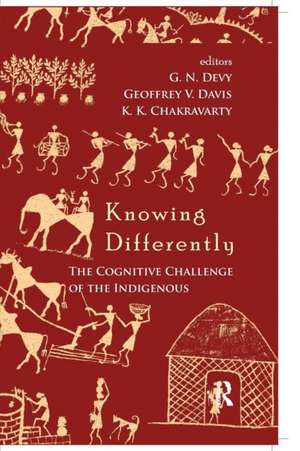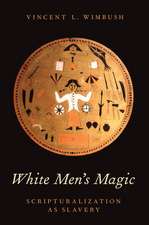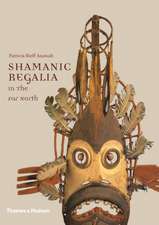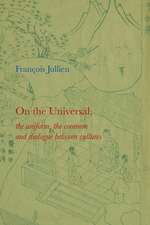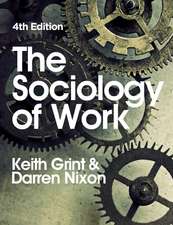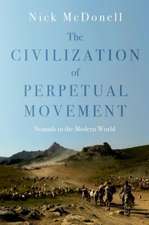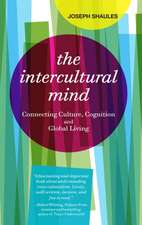Knowing Differently: The Challenge of the Indigenous
Editat de G. N. Devy, Geoffrey V. Davis, K. K. Chakravartyen Limba Engleză Paperback – 21 ian 2016
The volume inaugurates a new thematic area in post-colonial studies and cultural anthropology by highlighting the perspectives of marginalized indigenous communities, often burdened with being viewed as ‘primitive’. It will be useful to scholars and students of anthropology, sociology, cultural studies, history, linguistics, literature, and tribal studies.
| Toate formatele și edițiile | Preț | Express |
|---|---|---|
| Paperback (1) | 489.26 lei 6-8 săpt. | |
| Taylor & Francis – 21 ian 2016 | 489.26 lei 6-8 săpt. | |
| Hardback (1) | 1178.15 lei 6-8 săpt. | |
| Taylor & Francis – 17 oct 2013 | 1178.15 lei 6-8 săpt. |
Preț: 489.26 lei
Nou
Puncte Express: 734
Preț estimativ în valută:
93.63€ • 97.20$ • 78.07£
93.63€ • 97.20$ • 78.07£
Carte tipărită la comandă
Livrare economică 22 martie-05 aprilie
Preluare comenzi: 021 569.72.76
Specificații
ISBN-13: 9781138660120
ISBN-10: 1138660124
Pagini: 382
Dimensiuni: 152 x 229 x 20 mm
Greutate: 0.45 kg
Ediția:1
Editura: Taylor & Francis
Colecția Routledge India
Locul publicării:Oxford, United Kingdom
ISBN-10: 1138660124
Pagini: 382
Dimensiuni: 152 x 229 x 20 mm
Greutate: 0.45 kg
Ediția:1
Editura: Taylor & Francis
Colecția Routledge India
Locul publicării:Oxford, United Kingdom
Public țintă
PostgraduateCuprins
Introduction K. K. Chakravarty 1. Being ‘Primitive’ in a Modern World: The Andaman Islanders Vishvajit Pandya 2. Co-Existence of Multiple Timeframes: Narratives of Myths and Cosmogony in India Vibha S. Chauhan 3. Pimatisiwin Indigenous Knowledge Systems, North and South Priscilla Settee 4. Metaphors of Fertility, Phallic Anxieties and Expiation of Grief in the Babukusu Funeral Oratory Chris J. C. Wasike 5. The (Re-)imag(in)ing of the Oba of Benin in Nigerian Dramatic Literature and its Implications in Indigenous Studies Israel Meriomame Wekpe and Alero Uwawah 6. ‘Kasapa’: Mobile Telephony and Changing Healthcare Communication in Ghana Perpetual Crentsil 7. Discourse of Resistance and Protest in Meitei Folklore Leisangthem Gitarani Devi 8. Sovereign Ontologies in Australia and Aotearoa–New Zealand: Indigenous Responses to Asylum Seekers, Refugees and Overstayers Emma Cox 9. Indigenous Worldviews and Environmental Footprints: The Case of Prometheus vs Hermes A. O. Balcomb 10. Folk Heritage and Classical Lore: The Grand Narratives from the Aegean Archipelago and Derek Walcott’s Caribbean Creole Readings Eckhard Breitinger 11. Conceptualizing Space and Indigenous Knowledge: Articulations and Considerations for Natural Resource Management in the Himalayas Seema M. Parihar, P. K. Parihar, Soma Sarkar and Shilpy Sharma 12. Breaking the Power of Patriarchy: Unity Dow’s novel The Screaming of the Innocent Geoffrey V. Davis 13. The National, the Indian, and Empowering Performance: Festive Practices in the Highlands (Bolivia) Ximena Córdova 14. Contemporary Maori Painting: Pictorial Representation of Land and Landscape Dieter Riemenschneider 15. Art, Landscape, and Identity in She Plays with the Darkness, The Madonna of Excelsior and Cion Gail Fincham 16. Indigenous Languages in the Post-Colonial Era Zahid Akter 17. The Struggle for Survival: Globalization and its Impact on Tribal Women in Kerala Lata Marina Varghese 18. Eco-Fraternity of Kurum(b)a Tribes in Wayanad, Kerala Nelson P. Abraham.
Descriere
Knowing Differently provides a comprehensive account of the worldviews nurtured and sustained by indigenous communities across the world through their distinctive understanding — of space and time, joy and pain, life and death, the epistemological clash with the ‘scientific’ or ‘modern’ world, along with consequences for their identity, survival and cultural transformation.
